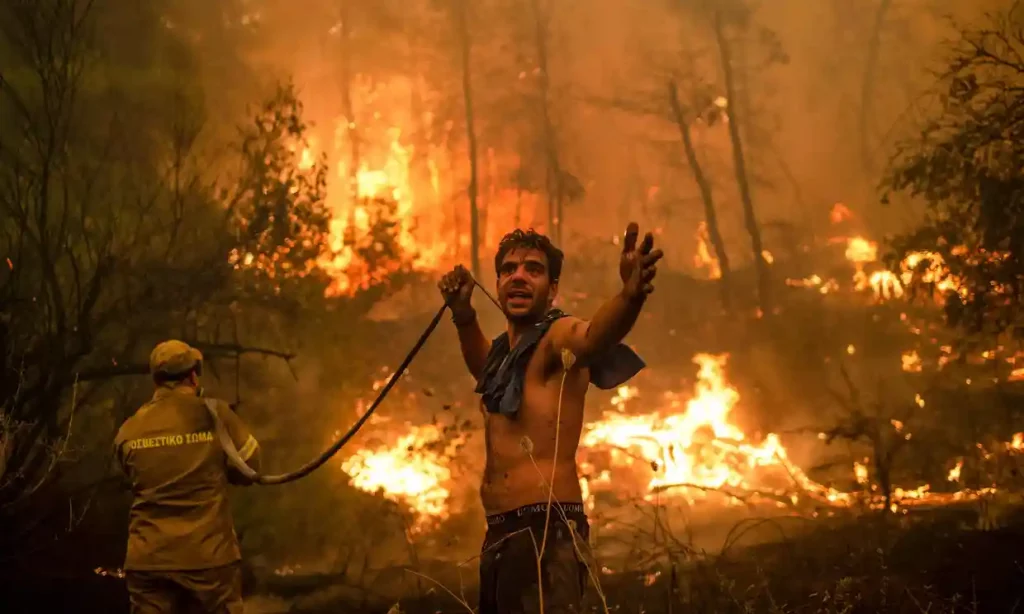THE GUARDIAN
17 de mayo, 2023
Forest fires approaching the village of Pefki on Evia island, Greece, in 2021. Photograph: Angelos Tzortzinis/AFP/Getty Images
UN agency says El Niño and human-induced climate breakdown could combine to push temperatures into ‘uncharted territory’
The world is almost certain to experience new record temperatures in the next five years, and temperatures are likely to rise by more than 1.5C above pre-industrial levels, scientists have warned.
The breaching of the crucial 1.5C threshold, which scientists have warned could have dire consequences, should be only temporary, according to research from the World Meteorological Organisation (WMO).
However, it would represent a marked acceleration of human impacts on the global climate system, and send the world into “uncharted territory”, the UN agency warned.
Countries have pledged, under the 2015 Paris climate agreement, to try to hold global temperatures to no higher than 1.5C above pre-industrial levels, after scientific advice that heating beyond that level would unleash a cascade of increasingly catastrophic and potentially irreversible impacts.
Prof Petteri Taalas, the secretary general of the WMO, said: “This report does not mean that we will permanently exceed the 1.5C specified in the Paris agreement, which refers to long-term warming over many years. However, WMO is sounding the alarm that we will breach the 1.5C level on a temporary basis with increasing frequency.”
Global average surface temperatures have never before breached the 1.5C threshold. The highest average in previous years was 1.28C above pre-industrial levels.
.
The report, published on Wednesday, found there was a 66% likelihood of exceeding the 1.5C threshold in at least one year between 2023 and 2027.
New record temperatures have been set in many areas around the world in the heatwaves of the past year, but those highs may only be the beginning, according to the report, as climate breakdown and the impact of a developing El Niño weather system combine to create heatwaves across the globe.
El Niño is part of an oscillating weather system that develops in the Pacific. For the past three years, the world has been in the opposing phase, known as La Niña, which has had a dampening effect on temperature increases around the world.
As La Niña ends and a new El Niño develops, there is a 98% likelihood that at least one of the next five years will be the hottest on record, the scientists found.
Taalas warned of the effects. “A warming El Niño is expected to develop in the coming months and this will combine with human-induced climate change to push global temperatures into uncharted territory. This will have far-reaching repercussions for health, food security, water management and the environment,” he said. “We need to be prepared.”
The Arctic is heating much faster than the rest of the world, and this appears to be having an impact on global weather systems, including the jet stream, which has disrupted weather across the northern hemisphere in recent years.
There is likely to be less rainfall this year in the Amazon, Central America, Australia and Indonesia, the report found. This is particularly bad news for the Amazon, where scientists have grown increasingly concerned that a vicious cycle of heating and deforestation could tip the region from rainforest into savannah-like conditions.
That could have calamitous consequences for the planet, which relies on rainforests as massive carbon sinks.
Over the next five years, there is likely to be above-average rainfall in northern Europe, Alaska and northern Siberia, and the Sahel, according to the report.
For each year from 2023 to 2027, the global near-surface temperature is predicted to be between 1.1C and 1.8C above the pre-industrial average, taken from the years 1850 to 1900.
The world has warmed considerably in recent years. In 2015, when the Paris agreement was signed, requiring countries to hold global temperature increases to no more than 2C above pre-industrial levels while “pursuing efforts” to hold them to 1.5C, it was forecast that the chance of temporarily exceeding the 1.5C threshold within the following five years was zero.
This November, governments will meet for the Cop28 UN climate summit, where they will assess progress towards meeting the goals of the Paris agreement. Known as the “global stocktake”, this assessment is likely to show that the world is far off track to reduce greenhouse gas emissions by the 43% this decade that is required to have a good chance of limiting temperature rises to 1.5C.
The free press is under attack from multiple forces. Media outlets are closing their doors, victims to a broken business model. In much of the world, journalism is morphing into propaganda, as governments dictate what can and can’t be printed. In the last year alone, hundreds of reporters have been killed or imprisoned for doing their jobs. The UN reports that 85% of the world’s population experienced a decline in press freedom in their country in recent years.
As you join us today from Ecuador we hope you will consider supporting us in our efforts to do something about this. Despite the financial challenges plaguing the media industry, we’ve decided to keep our journalism paywall-free, because we believe everyone has the right to high-quality, fact-checked reporting. And we maintain our independence thanks to generosity from readers all over the world, who understand that supporting the free press is an investment in an informed and empowered public.
Unlike many others, we have no billionaire owner – this helps us maintain the freedom to fearlessly chase the truth and report it with integrity. Your support will allow us to continue to work with trademark determination and passion to bring you journalism that’s always free from commercial or political interference.
Tomado de: https://www.theguardian.com/environment/2023/may/17/global-heating-climate-crisis-record-temperatures-wmo-research

